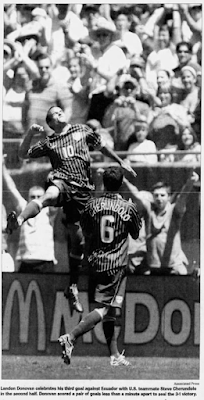On This Day in 2009, Altidore and Hejduk Inspired a Late Comeback in San Salvador
The road to the 2010 World Cup is rarely smooth, and on a humid night in El Salvador, the United States Men's National Team discovered just how treacherous that path could be. Just weeks after Michael Bradley's heroic performance against Mexico in Columbus, the Americans faced an entirely different challenge in the cauldron of Estadio Cuscatlan.
DaMarcus Beasley's memories of El Salvador stretch back to 1999, when he was a young under-17 player experiencing Central American soccer's raw, unfiltered passion. During a corner kick, he vividly recalled a fan throwing a dead chicken head at his feet, the crowd erupting in laughter. "It was pretty crazy," Beasley would later remember, "but it's something you experience when you play in those countries."
The March 28 match against El Salvador was more than another qualifying game. It was a test of character, a moment to prove the team's mettle under extreme pressure. The US lineup looked vulnerable with key players missing—Tim Howard was suspended, and Steve Cherundolo was injured. Brad Guzan, stepping into the goalkeeper's role, carried the weight of unexpected responsibility.
The match unfolded like a nightmare for the visiting Americans from the opening whistle. Eliseo Quintanilla struck first in the 15th minute, exploiting a costly Beasley giveaway. The goal sent the 30,500 fans into a frenzy, their voices rising like a thunderous wave across the stadium. In the 72nd, Cristian Castillo doubled El Salvador's lead, seemingly confirming the home team's dominance.
"El Salvador played with a tremendous amount of energy," US coach Bob Bradley said. "We found ourselves behind by two goals, and that wasn't part of the plan."
The statistics seemed grim. El Salvador, ranked 106th in the world, was dismantling the 17th-ranked United States. The Americans had not fallen behind El Salvador in a match for 16 years, and now they were staring at a potentially embarrassing defeat.
But this US team was built of sterner stuff. In the 77th minute, Jozy Altidore—a young striker with a growing international reputation—provided a lifeline. Receiving a perfectly weighted cross from Frankie Hejduk, he powered a header past the goalkeeper, injecting hope into the American effort.
Then, with just minutes remaining, Hejduk himself became the hero. Off a Landon Donovan corner kick that deflected off a defender, he rose unmarked and headed home the equalizer. The 2-2 draw was more than just a point - it was a statement of resilience.
"To come back with 30 minutes left and get a point is a positive," Guzan said, relief evident in his voice. "It shows just how good this team is."
The draw kept the US atop the CONCACAF qualifying group, maintaining their trajectory toward South Africa. The next challenge awaited in Nashville, where an electric atmosphere was already building for the match against Trinidad and Tobago. The excitement was palpable, with ticket sales already surpassing 18,000 and fans from across the country preparing to pack LP Field. Adding an intriguing subplot to the unfolding World Cup narrative, former Secretary of State Henry Kissinger had just joined the US World Cup bid committee a couple of days after the El Salvador victory. While he viewed the 2018 tournament as a long shot for the United States, he remained optimistic about future opportunities.
"I don't think we have a huge chance in 2018," Kissinger admitted. "I think it will probably go to Europe. But just as our 1986 bid set us up for 1994, I believe our bid for 2018 will position us perfectly for 2022."
For the players on the field in El Salvador, such long-term strategies meant little. Their focus was singular: qualification, one hard-fought point at a time. And on this night, against all odds, they had secured just that. The road to the World Cup continued, as unpredictable and exciting as ever.







